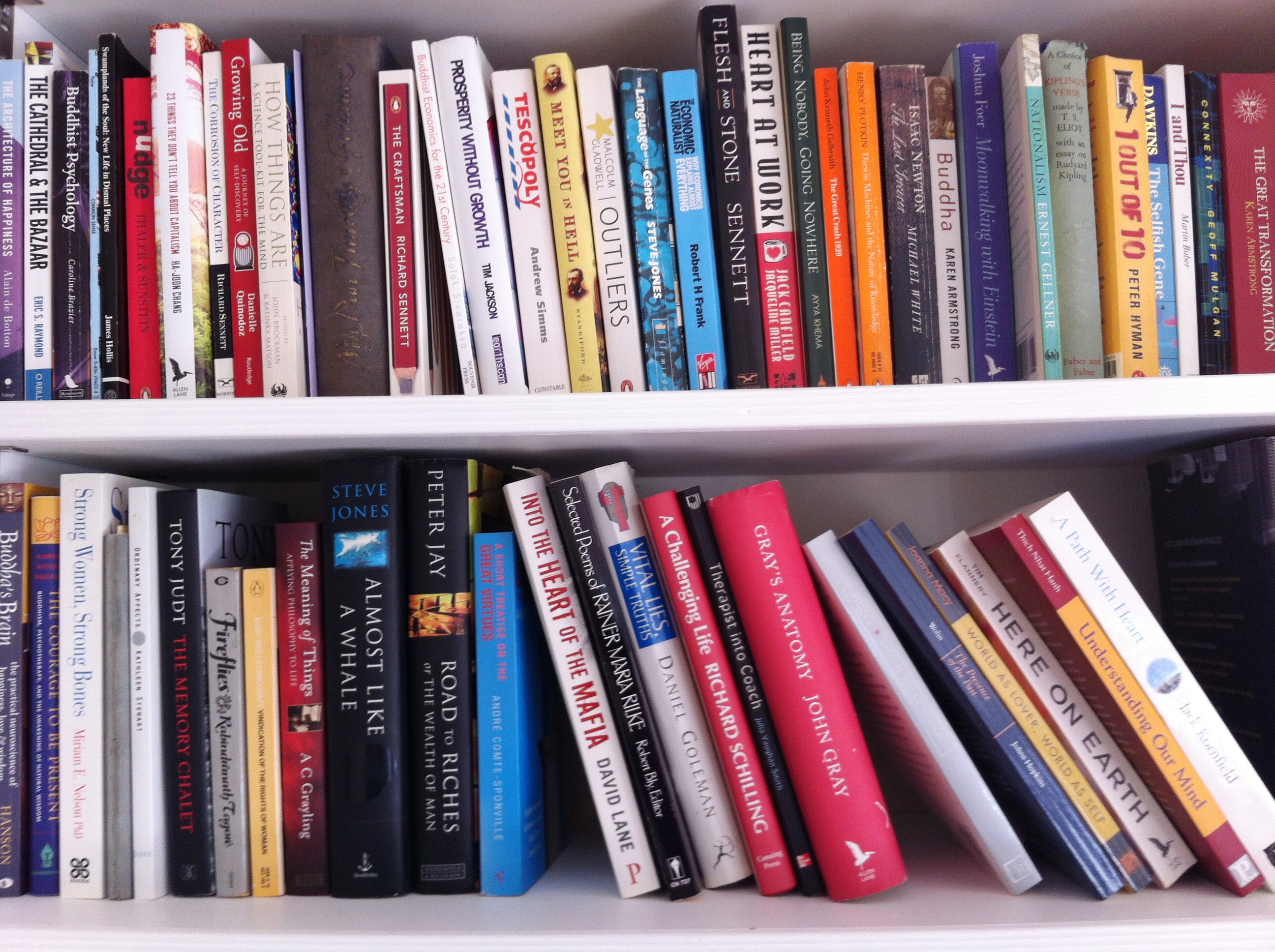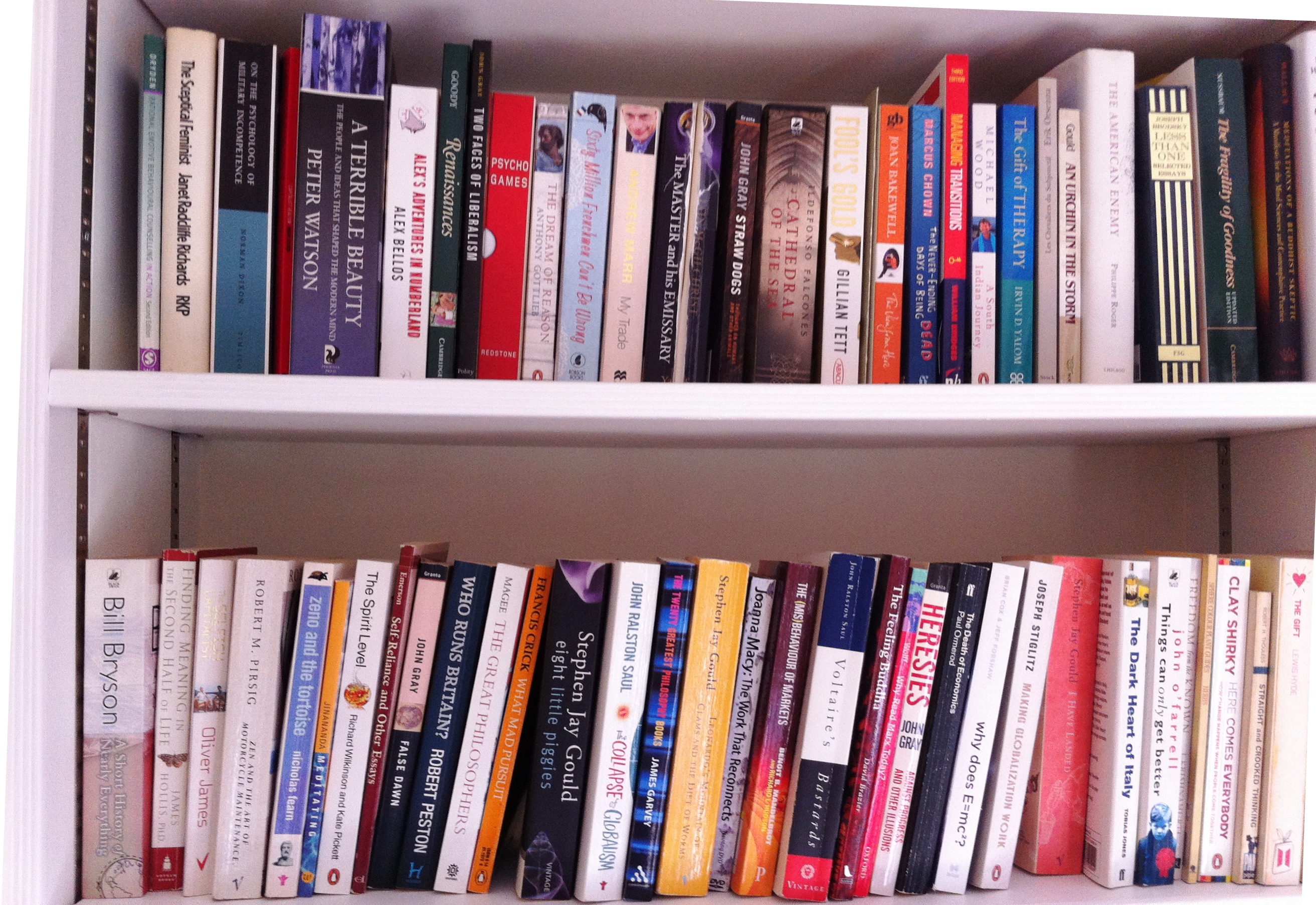 Oh dear! This page just hasn’t got to the top of my ‘to do’ list. And yet I have dozens of book reviews written by me or by participants on programmes I have led, that just need minor editing. If you are able and willing to help please get in touch.
Oh dear! This page just hasn’t got to the top of my ‘to do’ list. And yet I have dozens of book reviews written by me or by participants on programmes I have led, that just need minor editing. If you are able and willing to help please get in touch.
Why a page of book and podcast reviews and summaries? Because I notice that many in health care are not aware of the breadth of ideas, knowledge and insights outside their own professional sphere, and how fascinating, relevant and important many of these are.
As a result, although aware of how much our lives are shaped by beliefs and assumptions that can and should be contested, not least in the political and economic spheres, many do not have the knowledge and wisdom to do so, and are therefore not heard, or not credible, when they try.
On this page I am trying to introduce some of the resources that I and others have found valuable in broadening our perspectives and shaping credible, coherent arguments.
The selection may look skewed in thatit does not include many mainstream management or economic ideas. This is because they are the dominant discourse today and there are many other sites and programmes where they form the backdrop. I do believe they are important and relevant but also that they have too much of the available airtime and that the arguments below deserve much more of a hearing than they receive, especially in the NHS.
Book Reviews and Summaries
None of us have time to read everything we would like to! This section aims to give you enough of the argument of a book to be able to start using it straight away – and to decide whether you want to read it for yourself.
Some are written by me, some by colleagues, many of whom are busy GPs who wrote originally to share with colleagues on a leadership programme. So the styles will all be different and some of the views will be too.
Richard Murphy challenges many attitudes, assumptions and claims about tax and the tax system. He makes a case for relishing a society that takes tax seriously and shows us why and how. Much much more interesting than it sounds – and important too. The Joy of Tax.
Development as Freedom. Amartya Sen . Development can be seen as a process of expanding the freedoms that people enjoy. And if freedom is what development is about then it makes sense to concentrate on that rather than on some of the means or instruments of achieving it.This approach contrasts with others, such as identifying development with the growth of GNP, rise in personal incomes, or with industrialisation, technological advance, or social modernisation. These are all important but are means and not ends. Development as Freedom
Getting to Yes -negotiating an agreement without giving in. Roger Fisher and William Ury. Negotiation should produce a wise agreement, should be efficient, and should improve or at least not damage the relationship between the parties. Our tendency is to bargain over positions, but this doesn’t enable wise agreements, it isn’t efficient, and it isn’t fair in that success often goes to the harder player; what’s more it puts the substance of the negotiation and the relationship between the negotiators in conflict. So if you don’t want to bargain over positions then you have to change the rules of the game ……. Getting to Yes
1 out of 10. Peter Hyman. Peter Hyman was a key strategist and speechwriter for Prime Minister, Tony Blair from 1994 to 2003. He left this job, to take up an assistant’s post at an inner city comprehensive school in Islington, which had been failing. Superficially, this is a storybook, giving an outline of the goings-on behind the scenes at Number 10, and how the author managed to cope with being thrown in at the deep end at Islington Green School. However, there are far more serious messages in the book …. 1 out of 10
Prosperity Without Growth. Tim Jackson.The question at the heart of this book is one of social justice. We need to challenge the assumption that the continued consumption growth without greater attention to equity and sustainability can really deliver prosperity for all. Human society needs to change – its economics, its accounts, its implicit biases against natural capital (versus man made capital), against public wealth (versus private wealth) and against logic and …… Prosperity without Growth
The Corrosion of Character. Richard Sennet. In the first chapter Sennet describes meeting on a plane a man called Rico whose father, Enrico, he had interviewed 25 years earlier. His conversation with Rico leads to a comparison of their experiences of work and how it shaped their lives and characters. Enrico was a Janitor in an office building, who simply got on with his job without complaining about how he had ended up there. His work had one purpose throughout his life; to better his family and month by month he had put savings away until ……… The Corrosion of Character
What Does China Think. Mark Leonard. China’s rise is the big story of our age and historically may rival that of the rise and fall of the Roman, Ottoman, British Empire or the Soviet Union. Its economic rise is illustrated by the facts that it manufactures 50% of the worlds clothes and uses 40% of the worlds concrete and coal, 30% of its steel and 12% of its energy. The story of China’s intellectual awakening is much less well documented but China has in Beijing alone a dozen or so think-tanks each with a few thousand members. The author has observed them taking western ideas and adapt them into a new Chinese approach for dealing with the world, studying the way that China itself can shape its own destiny. what does China think
The Unconscious at Work. Individual and organisational stress in the human services. Ed Anton Obholzer and Vega Zagier Roberts. This book is based on the premise that groups that are part of larger organisations have both directly observable structures and functions and also an unconscious life comparable to that described by psychoanalysis in an individual. Institutions pursue unconscious tasks alongside the conscious ones and these affect efficiency and degree of stress of staff. If real change is to occur, then the social and psychoanalytic perspectives much be deployed together……… The Unconscious at Work
Systems Failure: Why governments must learn to think differently. Jake Chapman. Jake Chapman has been introducing government departments to succinct descritions of systems thinking for many years. SYSTEMS FAILURE
Complexity and Healthcare Organisation: A view from the street Ed David Kernick: The search for the correct organisational solution to the NHS . What happens when we look at the NHS as a complex adaptive system rather than as a machine? David Kernick is one of the founder members of the influential Healthcare complexity Group at the university of Exeter …..THE ORGANISATIONAL SOLUTION TO THE NHS
The Black Swan. Nassim Nicolas Taleb. ‘I had honestly never heard of the author Nassim Nicholas Taleb, and following reading the book I feel that he would be offended by such a comment …….’ TheBlackSwan
America, Empire of Liberty. A New History by David Reynolds This vivid and fascinating book, incorporating an explosion of new scholarship, tells of the origins and development of the United States. America
The English Enlightenment. Roy Porter. The Enlightenment is usually considered as a continental phenomenon, principally French, promoting atheism, republicanism and materialism and which culminated in the French Revolution in 1789. Roy Porter who is Professor in the Social History of Medicine at the Wellcome Institute for the History of Medicine, argues in this book that the 18th century in Great Britain was also a foment of enlightened thinking which has had a profound influence not only in this country in the following two centuries but also on enlightened thinking in Europe and America. English Enlightenment
Podcast Reviews
Meeting Reviews
We can’t go on meeting like this: a review of a meeting hosted by the Nuffield Trust and the IFS on the health of competition in the NHS we can’t go on meeting
